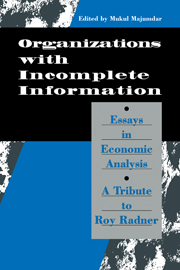Book contents
- Frontmatter
- Contents
- List of Contributors
- Preface
- Introduction: Searching for Paradigms
- 1 Equilibrium with Incomplete Markets in a Sequence Economy
- 2 The Existence of Rational Expectations Equilibrium: A Retrospective
- 3 Rational Expectations and Rational Learning
- 4 Dynamic Games in Organization Theory
- 5 The Equilibrium Existence Problem in General Markovian Games
- 6 A Practical Person's Guide to Mechanism Selection: Some Lessons from Experimental Economics
- 7 Organizations with an Endogenous Number of Information Processing Agents
- 8 A Modular Network Model of Bounded Rationality
- Index
8 - A Modular Network Model of Bounded Rationality
Published online by Cambridge University Press: 09 October 2009
- Frontmatter
- Contents
- List of Contributors
- Preface
- Introduction: Searching for Paradigms
- 1 Equilibrium with Incomplete Markets in a Sequence Economy
- 2 The Existence of Rational Expectations Equilibrium: A Retrospective
- 3 Rational Expectations and Rational Learning
- 4 Dynamic Games in Organization Theory
- 5 The Equilibrium Existence Problem in General Markovian Games
- 6 A Practical Person's Guide to Mechanism Selection: Some Lessons from Experimental Economics
- 7 Organizations with an Endogenous Number of Information Processing Agents
- 8 A Modular Network Model of Bounded Rationality
- Index
Summary
Introduction
Many phenomena of economic behavior and economic institutions that are still not well understood might be better analyzed via theories that take into account limitations on the ability of humans to calculate and reason. It has been thought since the 1930s that limitations on information processing capabilities of individuals are fundamental to the existence, structure, and functioning of such economic organizations as firms (see, e.g., Kaldor 1934). If there were no restrictions on the ability of human beings to process information (i.e., to observe, communicate, and compute) then there would be no need for multi-person administrative organizations. Physical and technological limitations require that production involve sharing of tasks among many individuals. The efficiencies resulting from division of labor and specialization create a need for coordination of effort in production. In the absence of information processing limitations, decision making would not in itself require multi-person information processing. The complex internal structures of firms and other administrative organizations cannot be understood without recognizing that information processing tasks therein are distributed among individuals.
The distribution of information which arises in part as the result of limitations on human information processing also contributes to incentive problems, because it can create sources of private information. The analysis of incentives is usually done in game models, typically under the assumption that players are fully rational individuals. This kind of model has often led to new insights into strategic situations that were previously not well understood. If this were always or even generally the case then there would be little pressure to complicate the analysis by introducing considerations of bounded rationality.
- Type
- Chapter
- Information
- Organization with Incomplete InformationEssays in Economic Analysis: A Tribute to Roy Radner, pp. 306 - 340Publisher: Cambridge University PressPrint publication year: 1998
- 1
- Cited by



